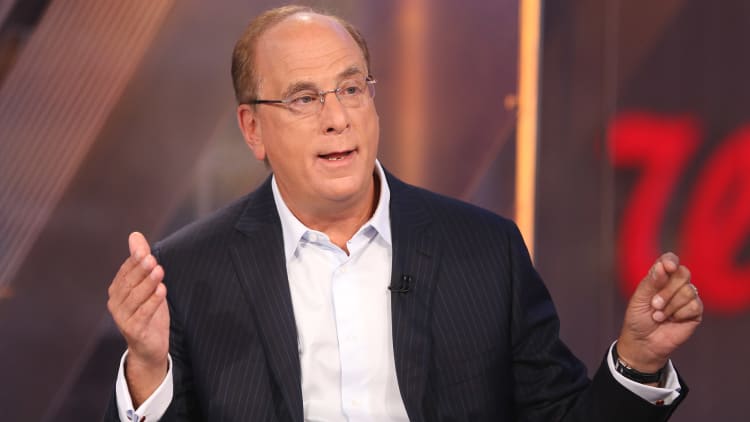
BlackRock chief Larry Fink told CNBC on Wednesday his greatest fear is an overly aggressive Federal Reserve: Too much tightening could put the bond market out of whack and hurt stocks.
Fink stressed that central bankers need to be careful as they continue to normalize monetary policy by gradually increasing interest rates and unwinding their massive balance sheets.
The Fed's balance sheet, or portfolio of fixed-income assets, swelled from nearly $870 billion in August 2007 to current levels of nearly $4.5 trillion through several rounds of bond-buying, also known as quantitative easing, to try to boost the economy and stabilize markets in the wake of the financial crisis.
"My greatest fear — and I'm not giving a high probability on it but there's certainly some probability on this — is that we have a very aggressive Federal Reserve," Fink said on "Squawk Box."
"People are assuming another tightening this year and another three next year. Could we see an inverted yield curve like next year [or] early 2019?" posited the co-founder of BlackRock, the world's largest money manager. "We want to avoid an inverted yield curve."
An inverted yield curve in the bond market occurs when yields for long-term debt dips below yields for short-term. Historically, this phenomenon happens when investors are worried about a recession and buy longer-term assets in search of higher yields. Bond prices move inversely to yields.
But Fink's concern is not around whether a recession is coming. He's arguing that with markets at such high levels, investors in search of higher returns could invert the yield curve by buying longer-term assets as the Fed puts more short-term assets on the market through unwinding the balance sheet.
"I just did a world tour and I'm going on another one starting next week. The demand we're seeing for long assets is unprecedented," Fink said. "We talk about all the growth in private equity and all the growth in real estate investing. You're seeing the surge in equity investing. People are looking for investments."
The global economic recovery — seen not only with growth in the U.S. but in Europe and China as well — is motivating investors to put more money to work, he said.
Therein possibly lies the problem, according to Fink.
"As the Federal Reserve begins its process of unwinding QE, the preponderance of their assets are five years or shorter," he said. "So could we see with tightening conditions through raising interest rates, through modest reversal of QE, continued demand in the long end, could we see this yield curve really flattening to possibly inverting?"
"That is not a good scenario long-term for equities," he warned.
The Dow Jones industrial average posted another record close on Tuesday, while the and the Nasdaq touched all-time intraday highs during the session.
On the promise of business-friendly policies from President Donald Trump, such as a corporate tax cut, the Dow and Nasdaq — based on Tuesday's close — are up 25.4 percent and 26.8 percent, respectively, since the November election. The S&P gained 19.2 percent over the same period.
The U.S. stock market "deserves a premium," Fink also told CNBC, saying American companies are stronger and better managed."
Fink appeared on CNBC shortly after BlackRock issued better-than-expected quarterly earnings and revenue. The investment firm's total assets under management for the third quarter swelled to nearly $6 trillion, a 17 percent increase from a year earlier.
WATCH: Full interview with BlackRock's Larry Fink



